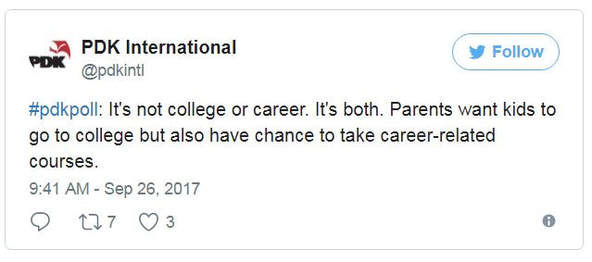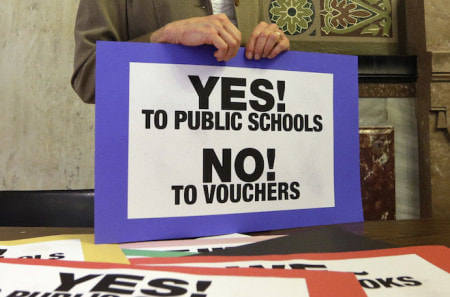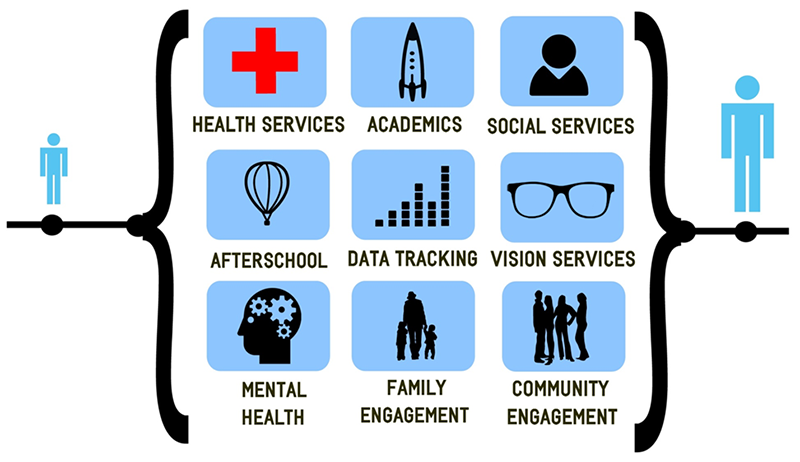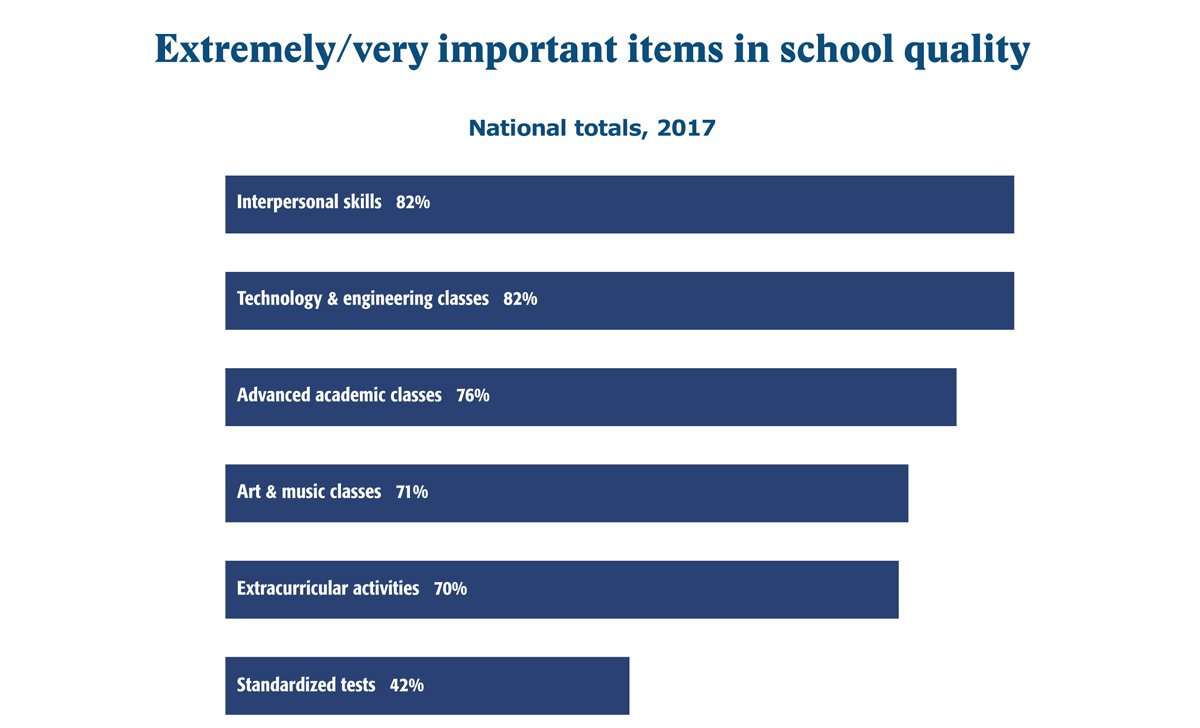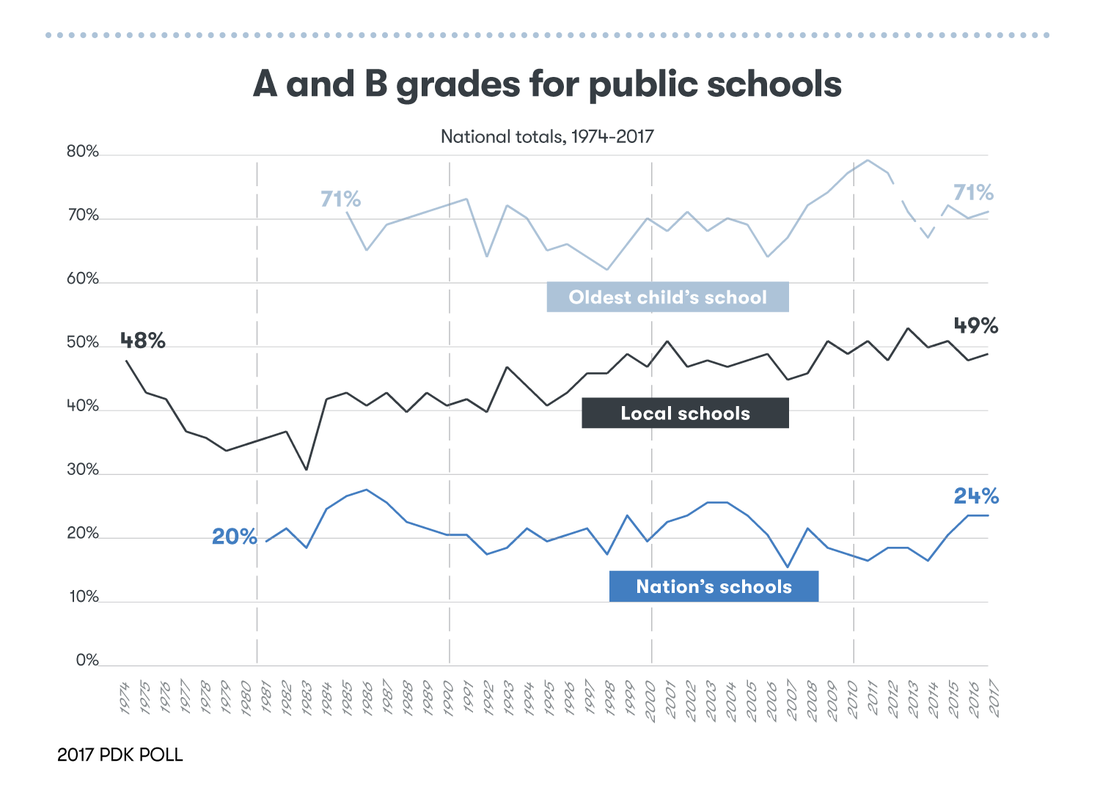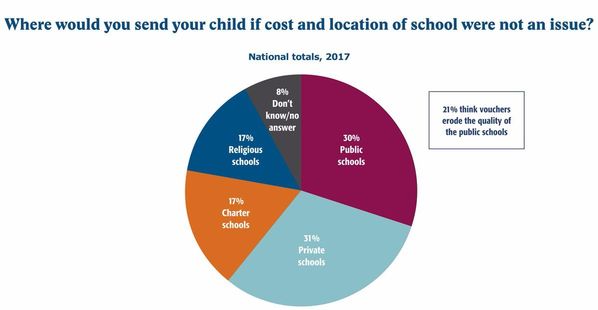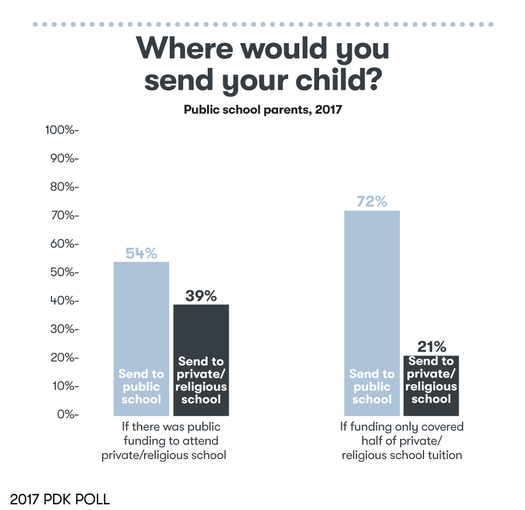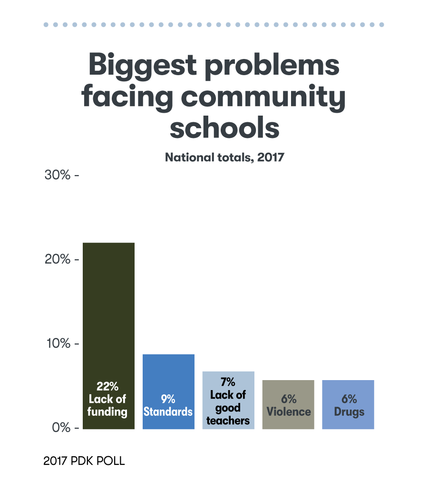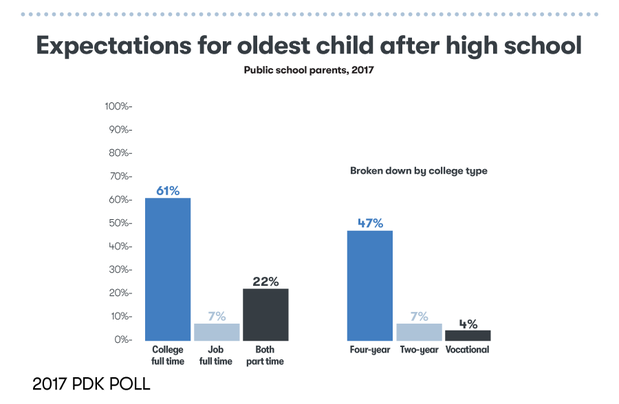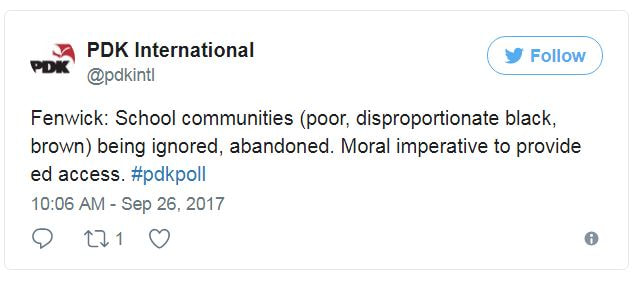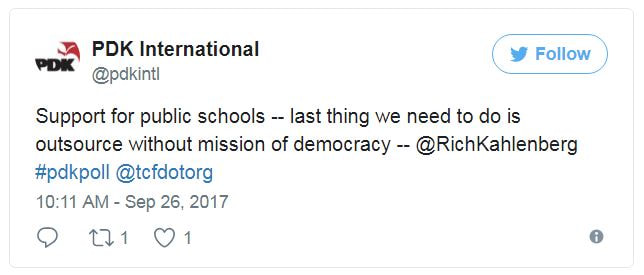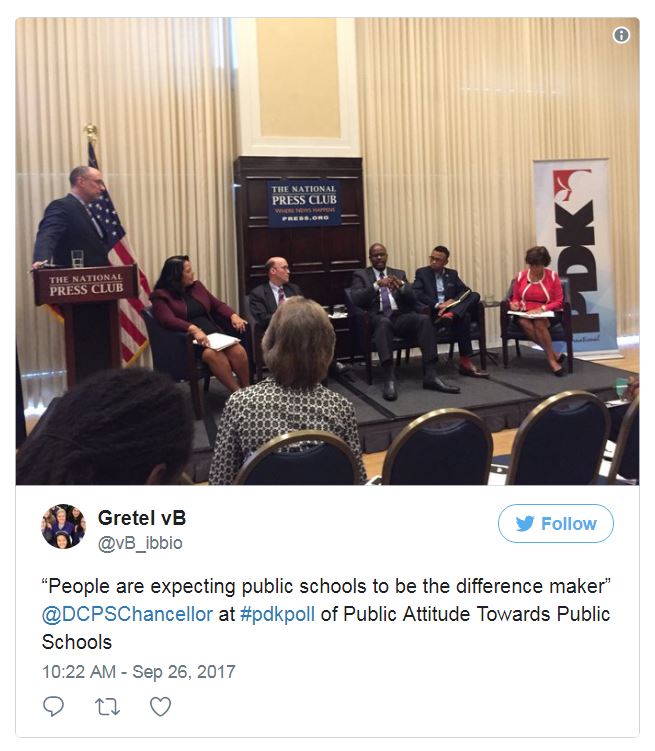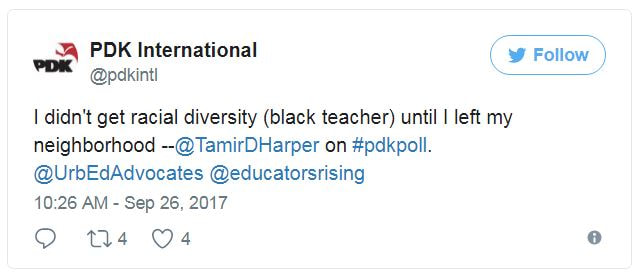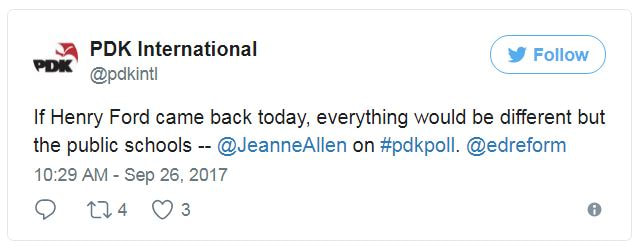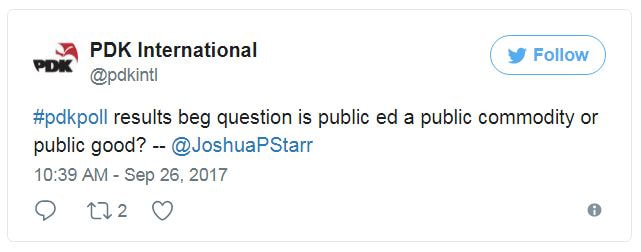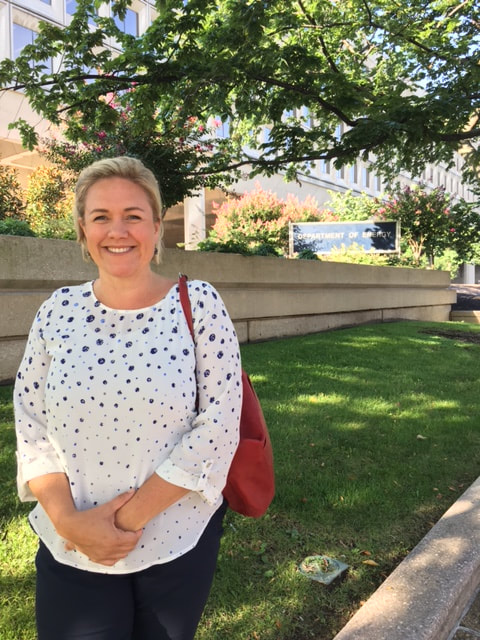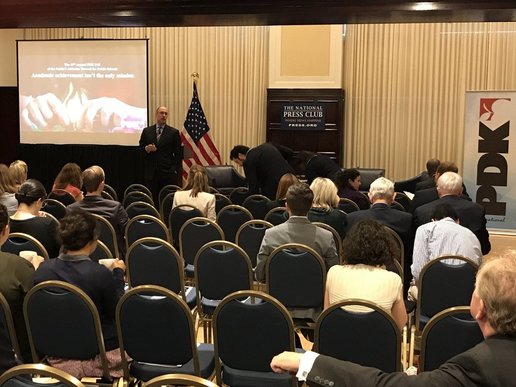 Photo @pdkintl via Twitter Photo @pdkintl via Twitter For 49 year, PDK International has been polling the American public regarding their attitudes towards the public schools. Yesterday I attended an event at the National Press Club at which the CEO PDK International (Joshua Starr) gave an overview of the poll results. Following the presentation, there was a panel discussion about the implications of the findings for education stakeholders. We all know too well that poll results can be misleading or incorrect, so we must have a healthy sense of skepticism around any findings. However, the PDK poll on education does follow a rigorous methodological process. In all, the results I'll share here are drawn from a sample size of 1,588 adults in the national population. There is a margin of sampling error of plus or minus 3.5 to 5 percentage points, depending on which sub-population was sampled. There is public access to the full national report. The thesis developed from the poll results is that academic achievement isn’t the only mission of public education. Under this thesis, the following key findings were shared:
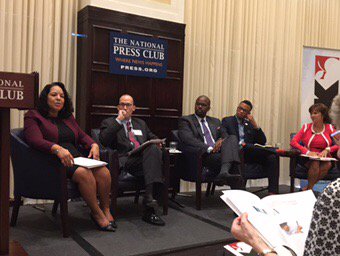 Photo @LLAMcNabb via Twitter Photo @LLAMcNabb via Twitter After the poll results were shared there was a interesting panel discussion about the implications of the information. There was a informative civil discourse between advocates from different perspectives (listed from left to right as seated for the discussion):
Leslie Fenwick, professor and dean emerita, Howard University School of Education Dean Fenwick commented that black parents are less satisfied than white parents with public schools. She commented that many students of color live in "education deserts" and that charter schools may be the "shelter in the storm" for families. I found her comment that the future majority in the United States (people of color) are currently the ones most suffering from being underfunded and under staffed by qualified teachers. Rick Kahlenberg, senior fellow, The Century Foundation Mr. Kahlenberg was heartened to know that Americans want schools to focus on broad educational goals, including interpersonal skills. He thinks the poll results show a clear public support for public schools. He commented that our nation should not, "outsource education to schools that don't have a core mission of supporting democracy." Antwan Wilson, chancellor of DC Public Schools I found Chancellor Wilson to be a powerful voice for the need to focus on the whole child. He said, "Academics are really important and LOVE is really important in schools." I think his comment is important for people to hear, especially since so many teacher enter the profession because they love kids and want to make a difference on individual kids lives. What's more, it is well established in educational research that kids will learn better from teachers they know care about them as individuals. "Our students need to FEEL the love we have for them." Love that. Tamir Harper, Educators Rising national student vice president Mr. Harper is a high school senior and future teacher. Can I just say that I wish more students at my school were considering a career in education? Mr. Harper spoke to the need to diversify the teacher workforce, stating that he didn't have a teacher of color until 9th grade and until after he went to school outside his neighborhood. His comment is not surprising, given that only 2% of nation's educators are black males and only 40% of our schools have any teachers of color on staff. Jeanne Allen, founder & CEO, Center for Education Reform I had the strongest reaction to the comments of Ms. Allen, an advocate for the parent choice/ school voucher movement. She seemed to imply that teaching and schools haven't changed for a hundred years. I think she is wrong on that point. Educational research and pedagogical advancements have changed the way schools educate young people. Henry Ford would not understand the value of many of the instructional approaches used in my classroom and those classrooms of nearly all of the teachers with which I interact. I'm sure Mr. Ford would have serious questions about why my students are dancing in class, why students are working together to problem solve without the teacher and why no textbooks are being used in the classroom. That said, Ms. Allen made a very good point when she stated that "information is no longer a commodity," suggesting a reason why many feel that interpersonal skills are so valued in schools. The presentation session finished with a philosophical question, raised by PDK International CEO Joshua Starr. He asked, "Is education a private commodity or a public good?" The question is posed to force a dichotomy in the answer. Me or us? The individual or the community? Of course, the answer can be both. In my opinion, K-12 education is about preparing an individual for life beyond high school (college and/or jobs) but also about ensuring our citizenship is educated and that our democracy works for the service of all.
|
Archives
July 2018
|
I give many of my IB Biology resources away, for the benefit of students and teachers around the world.
If you've found the materials helpful, please consider making a contribution of any amount
to this Earthwatch Expedition Fund.
Did I forget something? Know of a mistake? Have a suggestion? Let me know by emailing me here.
Before using any of the files available on this site,
please familiarize yourself with the Creative Commons Attribution License.
It prohibits the use of any material on this site for commercial purposes of any kind.
If you've found the materials helpful, please consider making a contribution of any amount
to this Earthwatch Expedition Fund.
Did I forget something? Know of a mistake? Have a suggestion? Let me know by emailing me here.
Before using any of the files available on this site,
please familiarize yourself with the Creative Commons Attribution License.
It prohibits the use of any material on this site for commercial purposes of any kind.
